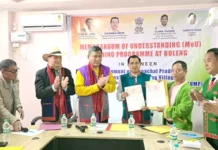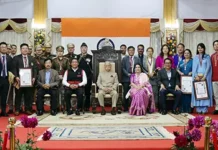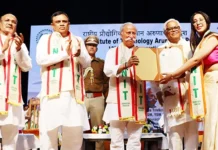[Giriraj Singh]
24 April is a historic day in the annals of history of local self-government system in India, as on this day of 1993, the president of India gave assent to the 73rd constitutional amendment, giving constitutional status to the panchayati raj institutions (PRI) in the country. Part 9 was added to the Constitution as a sequel to this amendment, providing three-tier system of panchayats, and devolution of powers and responsibilities to the panchayats.
The 73rd constitutional amendment completed its 30 years on 23 April.
PRIs are the pillars of democracy. To strengthen the PRIs, the central government, under the leadership of Prime Minister Narendra Modi, has made many efforts and committed more vigorous efforts during the amrit kaal. One of the major steps taken is the implementation of the PESA Act. Through this Act, we have established a strong system in which traditional panchayats working in some parts of the country are recognised according to their rules and regulations.
With the continuous efforts of our government, most of the states have implemented the PESA Act, and we are constantly encouraging the remaining states to implement it.
Under the visionary leadership of the prime minister, we have seen a quantum leap in the allocation of fiscal resources to PRIs to support various infrastructure requirements and developmental activities in rural areas. We have been taking many initiatives for strengthening and empowering PRI, increasing the capacity of representatives of PRIs to fulfill their role and responsibilities and improving the efficiency, transparency of functioning and accountability of the PRIs to contribute towards inclusive development, economic growth and achieving the Sustainable Development Goals (SDG).
It is our endeavor that the PRIs, by self-assessment of their needs, develop their own sources of revenue, along with the funds of the government schemes, through public participation, and implement the schemes according to the needs of the panchayats from those funds and continue to proceed on the path of progress.
Gram sabha is central as well as integral to local self-governance and very essential for transparent and accountable functioning of gram panchayats, and our government has been encouraging conducting vibrant gram sabhas, involving all stakeholders.
It has been the constant endeavor of the central government that after the 73rd constitutional amendment, the PRIs should not only be empowered by the states in the field of 29 subjects allotted to them, but should also be made functional. Many states have made better efforts in this course. The Jammu & Kashmir administration, especially J&K Lieutenant Governor Manoj Sinha, deserve appreciation for the serious efforts made in this direction. Similarly, other statesand union territories should also make concerted efforts for the empowerment of the PRIs.
The central government has renewed its focus on building the governance capability and training of the elected representatives and various functionaries of the PRIs to work at the local level on localisation of SDGs and realignment of the gram panchayat development plans (GPDP) to LSDGs. It is noteworthy that by 2022-’23, almost all gram panchayats and equivalent bodies have been able to prepare their GPDPs.
For bringing in efficiency, transparency and accountability in local governance, the panchayati raj ministry has ensured digitalisation of panchayats, providing digital solution like the e-GramSwraj application for all activities in the digital mode, from planning to payment.
The latest is initiative is procuring of goods and services by the panchayats on the GeM, which was launched on Sunday by the prime minister at Rewa, Madhya Pradesh. The AuditOnline application has been developed for online audit of panchayat accounts. Thus, the e-governance initiatives with the motto of ‘minimum government and maximum governance’, has percolated to the local government, which is the sole contribution of our government as our PM launched the e-GramSwaraj application in April 2020.
The PM Svamitva scheme, an innovative idea of our PM, provides the ‘record of rights’to village household owners through issuance of property cards. The record of right is proving a game-changer in asset monetisation in the rural areas, besides enabling the panchayats in assessing and collecting property tax in the near future in their endeavor to enhance their own sources of revenue.
The panchayati raj ministry has made remarkable progress in the direction of its goal for empowerment and self-sustainability of the PRIs by converging the plans of other ministries and active public participation under the leadership of the local peoples’ representatives in the states, and redoubling its efforts in this direction during the Azadi Ka Amrit period. (Giriraj Singh is union rural development & panchayati raj minister.)



